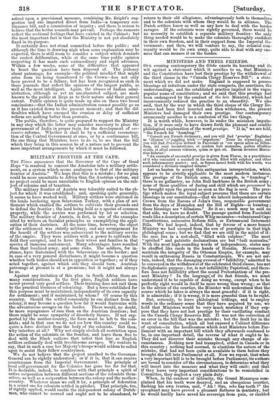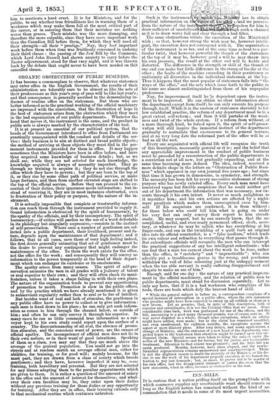MINISTERS AND THEIR FRIENDS.
Ottu evening contemporary the Globe exerts its learning and its wit against a statement which it ascribes to us, that Ministers and the Constitution have lost their prestige by the withdrawal of the third clause in the "Canada Clergy Reserves Bill": a state- ment which we did not make. England is supposed to possess blessings ad infinitum under the state compacts, the sanctions, the understandings, and the established practice implied in the vague popular name of constitution ; and we said, that this prestige had been endangered by the conduct of the late Ministry, which had inconveniently reduced the practice to an absurdity. We also said, that by the way in which the third clause of the Clergy Re- serves had been first inserted and then withdrawn, the present Ministers had damaged their own prestige. Our contemporary erroneously ascribes to us a confusion of the two things. It is worth while, however, to lie under the mistaken imputa- tion, if it were only to have drawn forth the pleasant and erudite philological explanation of the wordprestisie. "It is," we are told, "the French for ` humbug.' " "Consult any French dictionary, and you will find prestige' Englished as 'illusion'—' juggling trick imposture.' Trace its etymology, and you will find Preestigio defined in Facciolati as 'rca specie mum ad fallen- dum, uti aunt incantationes, et quidam ludi manuales, quibus illuditur oculis, et aliud ceniere videmur, quoin re ipsa. sit. Eartun inventor Mercu- rius habetur.'
"An example of successful prestige is given from Florus, in a practitioner of it who concealed a nutshell in his mouth, filled with sulphur, and other such inflammatory matter; and, as flames issued forth with his words, was considered a divinely-inspired debater."
Let us hasten to accept this antiquarian interpretation, which appears to be strictly applicable to the most modern instances. The prestige of the British arms for example, is " humbug " re
the is no gallantry, no John Bull backbone in the British army; none of those qualities of daring and skill which are presumed to be brought upon the ground as soon as the flag is seen. The pres- tige which makes the loyal subject presume that there are certain blessings in our constitution—that we inherit independence of the Crown from the Barons of John's time, responsible government from the days of Hampden and the Bill of Rights—is humbug ; those blessings are "delusions." Be it so ; much may be said on that side, we have no doubt. The passage quoted from Facciolati reads like a description of certain Whig measures—volunteered Cape Constitutions successive Reform Bills, or Extramural Interment Bills. We had hoped, indeed, that by favour of a more honest Ministry we had escaped from the Fera of prmstigim in that high philological sense ; but we find that we are still in the midst of it : the case lies in a nut-shell, "filled with sulphur!' The most " spirited " and patriotic declamations are but " ludi manuales," With the most high-sounding words of independence, states may be shuffled like cards in the hands of Houdin. Movements to maintain the integrity of the Ottoman Empire, for example, may result in enthroning Russia in Constantinople. We are not cer- tain, indeed, that the damaging avowal of" fallibility," admitted to be conveyed in the withdrawal of the celebrated third clause, has not its diplomatic purpose ; for, is not infallibility Papistical, and there- fore does not fallibility attest the sound Protestantism of the pre- sent Ministry ? In the language: of its fast friends, we must understand it to be capable of doing no wrong, except when to be perfectly right would in itself be more wrong than wrong; so that in the advice of the courtier, the Minister will understand that the course which he takes is always the most graceful : if it is right, it is admirable ; if it is wrong, it is more graceful than to be right.
But, seriously, to leave philological triflings, and to employ
words in the ordinary sense that they have acquired by use, we hold that Ministers would be very much mistaken if they sup- pose that they have not lost prestige by their vacillating conduct on the Canada Clergy Reserves Bill. It was not the correction of an error in the bill that was the mistake ; but the fault lay in the want of consultation, which all but exposed a Cabinet difference of opinion—in the heedlessness which sent Ministers before Par- liament with an important bill which they afterwards confessed to be, in one important detail, the reverse of what it ought to be. They did not discover their mistake through any change of cir- cumstances. Nothing new had transpired, either in Canada or in this country ; nothing had accrued, to elucidate the nature of the mistake, that had not been quite as available to them before they brought the bill into Parliament at all. Now we repeat, that when a very important bill is to be brought before Parliament,its authors are bound to consider all the circumstances, to determine what they will insert into the measure and what they will omit; and that if they leave very important considerations to be remodelled in Committee, they neglect a very plain duty.
i When, n the candour of infirmity, the Grand Nonarque com- plained that his teeth were decayed, and an obsequious courtier,
Bashing his own ivories, said, " ! Sire, who has teeth P" the sycophant may have proved a pleasant flatterer in dentistry, but he would hardly have saved his sovereign from pain, or enabled
him to masticate a hard crust. It is for Ministers, and for the public, to say whether true friendliness lies in warning them of a weakness which may make them fall at the most critical part of the career, or in assuring them that their mistakes are nothing worse than graces. Their mistake was the more damaging, and therefore the more culpable, since they have more important work than the Canadian Bill before them, for which they will need all their strength—all their "prestige." Nay, they had important work before them when time was fruitlessly consumed in undoing their third clause : the passing of the Jew Bill by the Commons, which Lord John Russell had shown anxiety to carry before the Easter adjournment, stood for that very night, and it was thrown back by the debate that ought never to have been needed on this cancelled clause.



























 Previous page
Previous page